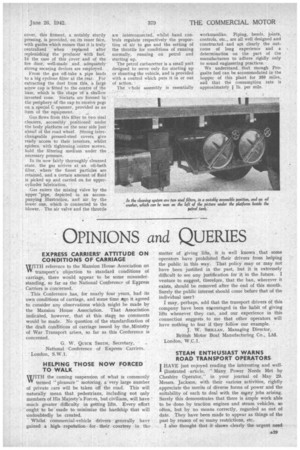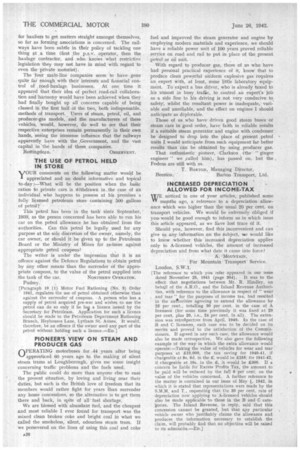OPINIONS and QUERIES
Page 31

Page 32

If you've noticed an error in this article please click here to report it so we can fix it.
EXPRESS CARRIERS' ATTITUDE ON CONDITIONS OF CARRIAGE
WITH reference to the Mansion House Association on VY transport's objection to standard conditions of carriage, there would appear to be some misunderstanding, so far -as the National Conference of Eirpress
Carriers is concerned. • This Conference has, for nearly four years, had -its own conditions of carriage, and some time &go it agreed to consider any observations which might be made by the Mansion House Association. That Association indicated, however, that at this stage no comments would be made. No question of the standardization of the draft conditions of carriage issued by the, Ministly of War Transport arises, so far as this Conference is concerned.
G. W. Quicx SMITH, Secretary, National Conference of Express Carriers. -London, S.W.1.
HELPING 'THOSE NOW FORCED TO WALK
wirni the coming suspension of what is commonly vv termed " pleasure " motoring, a very large number of private cars will be taken off the road. This will naturally mean that pedestrians, including not only members of His Majesty's Forces, but civilians, will have much greater difficulty in getting lifts. Every effort ought to be made to minimize the hardship that will undoubtedly be created.
Whilst commercial-vehicle drivers generally have gained a high reputation for their courtesy in the matter of giving lifts, it is well known :that some operators have prohibited fheir drivers from helping the public in this way. That policy may or may not have been justified in the past, but it is extremely difficult to see any justification for it in the future. I venture to suggest, therefore, that the ban, wherever it exists, should be removed after the end of this month. Surely the public interest should come before that of the individual user?
1 may, perhaps, add that the transport drivers of this company have been encouraged in the habit of giving lifts whenever they can, and our experience in this connection suggests . to me that other operators will have nothing to fear if they folIOw our example.
J. W. SHreLari, Managing Director, British Motor Boat Manufacturing Co., Ltd. London, W.C.1.
STEAM ENTHUSIAST WARNS ROAD TRANSPORT OPERATORS
'HAVE just enjoyed reading the interesting and wellillustrated article, "Many Power Needs Met by Cheshire Operator," in your journal of May 29. Messrs. Jackson; with their various activities, rightly appreciate the merits of diverse forms of power and the suitability of each to deal with the 'hey jobs arising. Surely this demonstrates that there is ample work able to be done by traction engines• and steam vehicles, so often, but by no means correctly, regarded as out of date, They have been made to appear as things of the past by reason of so many restrictions, etc.
I also thought that it shows clearly the urgent need
for hauliers to get matters straight amongst themselves, so far as forming associations is concerned. The railways have been subtle in their policy of tackling 'one thing at a time (first the p.s.v. operator„ then the haulage contractor, and who knows what restrictive legislation they may not have in mind with regard to even the private 'motorist).
The four main-line companies seem to have. gone quite far enough with their interests and financial control of road-haulage. businesses. At' one time it appeared that their idea of perfect road-rail collaboration andharrnony would have been achieved when they had finally bought up all concerns capable of being classed in the first half of the two, both indispensable, methods of transport. Users of steam, petrol, oil, and producer-gas models, and the manufacturers of these vehicles, would, however, do well to see that their respective enterprises remain permanently in their own hands, seeing the immense influence that the' railways apparently have with the .,Government, and the vast capital in the hands of these companies.
Rottingdea n. OBSERVENT.
THE USE OF PETROL HELD IN STORE •
YOUR comments on the following matter would be appreciated and no doubt informative and topical to-day :—What will be the position when the ba'Sic ration to private cars is IXrithdrawn in the case of an individual who happens to possess at his premises a fully licensed petroleum store containing 500 gallons
of petrol? • • • • •
This petrol has been -in the tank sinee September, 1939, as the person concerned has been able to run his car on the petrol allowance he has obtained from the authorities. Can this 'petrol be legally used for any purpose at the sole discretion of the owner, namely, the car owner, or should it be given up to the Petroleum Board or the Ministry of Mines for re-issue against appropriate petrol coupons?
The writer is under the impression that it is an offence against the Defence Regulations to .obtain petrol by any other means than the surrender of the appropriate coupons, to the value of the petrol supplied into
the tank of the car. NORTHERN OPERATOR. Pudsey.
[Paragraph 10 (1) Motor Fuel Rationing No. 3) Order 1941, regulates the use of petrol obtained otherwise than against the surrender' of coupons. A person who has a supply of petrol acquired pre-war and wishes to use the petrol -can do so only if he hal a licence issued by the Secretary for Petroleum. Application for such a licence should be made to the Petroleum Department Rationing Branch, Heyhouses Lane, Lytham St, Armes. It would, therefore, be an offence if the owner used any part of the petrol without holding such a licence.—En.] PIONEER'S VIEW ON STEAM AND PRODUCER GAS
nPERATING motorbuses for .44 years after 'being apprenticed 60 years ago to the making of silent steam trams at Loughborough, gives me some insight concerning traffic problems and the fuels used.
The public could do more than anyone else to ease the present situation, by loving and living near their duties; but such is the British love of freedom that its members would rather fight for years than surrender any home concessions, so the alternative is to get them there and back, in spite of all fuel shortage.
We are blessed with abundant fuel, and the cheapest and most reliable I ever found for transport was the mixed clean broken coke and bright coal in what we called the smokeless, silent, odourless steam tram. If we persevered on the lines of using this coal and coke
fuel and improved the steam generator and engine -by employing modern materials and experience, we should have a reliable power unit of 100 years proved reliable service on road and rail to put in place a the present petrol or oil unit.
With regard to producer gas, those of 119 who have had personal practical experience of it, know that to produce clean powerful uniform explosive gas requires an expert with, at ,least, some little laboratory equipment. To expect a bus driver, who is already taxed to his utmost in" busy traffic, to control an expert's job as. a side line to his driving is not very conducive to safety, whilst the resultant power is inadequate,. variable and unreliable, and the effect on engines I should anticipate as deplorable.
Those of us who have driven good steam buses or steam cars in good order,. have faith in reliable results if a suitable steam generator and engine .with condenser be designed to drop into the place of present petrol units l would anticipate from such equipment far better results than can be obtained by using. producer gas.
That enthusiastic pioneer, Clarkson, (the " ginger engineer" we ,called him), has passed on, but the Fodens are still with us.
T. BARTON, Managing Director,
Beeston. Barton Transport, Ltd.
INCREASED DEPRECIATION ALLOWED FOR INCOME-TAX
WE noticed in one of your articles,' published some months ago; a referenceto a depreciation allowance which was higher than the usual 20 per cent, on transport vehicles. We would be extremely obliged if you-would be good enough to inform us in which issue this article appeared, as we liave lost trace of it.
Should you, however, find this inconvenient and can give us any information on the subject, we would like to know whether this increased depreciation applies only to A-licensed vehicles, the amount of increased depreciation and from what date it came into force?
A. MOM'CIAIN, For Mountain Transport Service. London, S.W.1.
[The referenceto whin you refer appeared in our issue dated November 28, 1941 (page 304). ft was to the effect that negotiations between Mr. R. Hindley, on behalf of the A.R.O., and the Inland Revenue Authorities, with reference to the allowance in respect of " wear and tear " for the purposes of income tax, had resulted in the autorities agreeing to extend the allowance by 25 per _cent, totalling 30 per cent, in the case. of A licensees (for some time previously it was fixed at 20 per cent. plus 20, i.e., 24 per cent, in all). The extension was retrapective from April, .1940, In the case of B and C licensees, each case was to be decided on its merits and proved to the satisfaction of the Commissioners. If agreed in any such case, the allowance would also be made retrospective. We also gave the following example of the way. in which the extra allowance would operate:---Taking the value of vehicles for wear arid tear purposes at £10,000, the tax saving for 1940-41, if chargeable at 8s. 6d. in the E, would he EZ55; for 1941-42, if chargeable at 10s. in the £, it would be £300. If a concern be liable for Excess Profits Tax, the amount to be ,paid will be reduced by the full 6 per cent, on the value of the vehicles concerned. A further reference to the matter is. contained in our issue of May 1, 1942, in which it is stated that representations were made by the S.M.M. and T., requesting that the 30 per cent, rate of depreciation now applying to A-licensed Vehicles should also be made applicable -to those in the B and C cate'gories, The Inland Revenue, in reply, said that this concession cannot be granted, but that any particular vehicle owner who justifiably claims the allowance and produces the information necessary to establish the claim, will probably find that no objection will be raised to Its admission.—En.]




















































